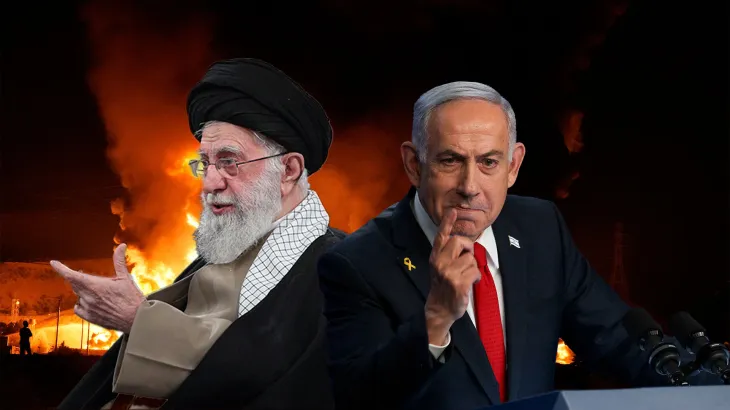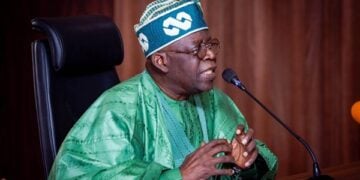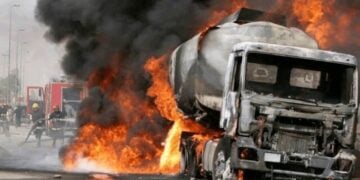As the war between the State of Israel and the Islamic Republic of Iran enters its tenth day, experts on global affairs have warned that further escalation of the conflict has the potential of disrupting trade routes, affect oil prices and disturb world peace as more alliances are beginning to manifest with a threat of a looming “Third World” War.
Many of the experts who spoke with LEADERSHIP Sunday expressed dismay at the sudden eruption of hostilities between the two embittered foes allegedly sworn to a doctrine to destroy each other, and called for caution.
Escalation Of Conflict Shocking
Speaking with LEADERSHIP Sunday, a former Nigerian High Commissioner to Singapore, Ambassador Ogbole Ode said given that the Middle East (or West Asia) has always been a zone of keen interest, rumblings there will always reverberate across the globe.
He said, “It is a zone of keen interest because in economic terms, it is home to a significant deposit of fossil fuels – crude petroleum and its associated natural gas. Secondly, it is the zone of origin of the three religions traced to Abraham – Judaism, Christianity and Islam.
“Thus, the first attribute grants that world powers view the zone as a zone of special economic interest as a source of fossil fuels and the second attribute grants that the zone is of special interest to faith-based organisations.”
He advised that the protagonists and their supporters and sympathisers sheath their swords and go to the negotiating table.
On how the crisis will affect Nigeria in particular, if it escalates, the former envoy, who once served in Iran, said the conflict will lead to a spike in crude oil prices and that will be a welcomed development for Nigeria stating that he first oil boom the country enjoyed was on the back of the Arab-Israeli war in 1973.
From the perspective of the faith-based organisations and their adherents, the former envoy said that given that Nigerians, on the average, are a very religious (but not necessarily godly) people, it will lead to a further polarisation of the religious majority which is not good for a society that is already stressed to the limits.
On the divergent position of world leaders in the lingering crisis, the former ambassador said, “Nations will always respond, react or initiate actions that are in tune with their national interests. So, response or reactions to the crisis will be dictated by the interests of nations both contiguous to the conflict zone and otherwise.
“My take on this is that global leaders must know that negotiations are the best option for a lasting settlement of the crisis. Recall that the Russo-Ukraine war is still on, Ditto for the Sudanese implosion. While this may be good news for armament merchants, it is certainly bad news for the generality of the global community.”
Also reacting to the escalating confrontation, Dr. Sam Oni of the Department of Political Science and International Relations, MIVA Open University of Nigeria, warned that the crisis threatens to shatter regional stability, stressing that there is a risk of wider Middle East war as proxy groups in Lebanon, Syria and Yemen could join, drawing in global powers through alliances.
He also pointed out the crisis portends global economic and security shocks. “The conflict could disrupt global energy security via chokepoint attacks at the Strait of Hormuz which can trigger a surge in oil prices and global inflation. There is also the aspect of nuclear proliferation concerns. Preemptive strikes may derail diplomatic solutions to Iran’s nuclear programme,” he said.
Dr. Oni called for an urgent need to accelerate multilateral ceasefire diplomacy via the EU–US–Gulf framework. He said the European leaders meeting in Geneva on Friday, June 20, 2025, proposing a package linking an immediate ceasefire with Iran limiting uranium enrichment, constraining missile development, and halting extremism funding could be critical in de-escalating the conflict and dousing tension.
“This is critical because this tri- regional initiative (Europe, U.S., Gulf States) generates political leverage on both sides. Gulf intermediaries like Qatar and Oman are trusted by Tehran, while Europeans provide diplomatic cover for Washington’s messaging.
“My recommendations are to firmly tie ceasefire terms to specific incentives, e.g., calibrated sanctions relief tied to verifiable compliance and to use Gulf facilitators to ensure Iran’s buy-in before public announcements.
“Another advice is to establish demilitarised humanitarian zones around civilian infrastructure. Previous use of buffer zones like Lebanon’s Blue Line under United Nations Security Council (UNSC) Resolution 1701 demonstrated potential to protect hospitals, schools, and essential services,” he said.
Another solution, according to Dr. Oni, is to engage regional powerbrokers (China, Russia, and Turkiye). For instance, Chinese President Xi has explicitly warned of global instability if the Middle East flares, suggesting China is open to diplomatic engagement though without direct sanctions. Moscow has urged restraint from all parties, cautioning that U.S. support for Israel could destabilize Iran further and President Erdoğan and Ankara have offered mediation, citing strategic regional influence.
Nigeria Should Watch Out For Misguided Elements
On how the crisis can have potential impact on Nigeria, the don said Nigeria is a religiously volatile country so the war could trigger religious crisis in in the country, particularly, some parts in the Northern regions, warning that extremist groups could exploit the crisis, increasing terrorism risks
Nigeria’s economy, heavily reliant on oil exports, could benefit from higher crude prices. However, refining constraints mean domestic fuel prices would also spike fueling inflation and currency depreciation. This will badly hurt households and industries, he said.
He warned that heightened global risk aversion may reduce foreign direct investment and worsen Nigeria’s access to external financing. Travel disruptions may affect Nigerians in Israel and their remittances home, he added.
On divergent global reactions, he said the ongoing conflict between Iran and Israel has drawn a wide range of international reactions, with world leaders and international organisations expressing sharply divergent positions rooted in strategic alliances, regional interests which align largely along ideological and economic lines, and broader geopolitical calculations.
He said, “The United States, Israel’s closest ally, has largely maintained its traditional stance of unwavering support for Israel’s right to defend itself, adding that officials, including the President and State Department representatives, have consistently condemned Iranian aggression, particularly Iran’s role in supporting non-state actors like Hezbollah and Hamas.
“On the other side, Russia and China have offered more sympathetic perspectives toward Iran. Russia, while officially calling for restraint, has criticized Western “double standards” and has, at times, aligned with Iran rhetorically in opposing what it calls Western interventionism. China, maintaining its image as a neutral power broker, has urged both sides to avoid escalation but has also criticized unilateral Western support for Israel, particularly in the UN Security Council. Lebanon, Syria, and Iraq, all hosting Iranian-aligned militias, have either remained silent or tacitly supported Iran, portraying Israeli actions as aggressive or expansionist.
Arab World Divided Over Crisis
“The Arab world has shown a divided and cautious stance. Countries like Saudi Arabia, the UAE, and Jordan, which have normalized or improved ties with Israel in recent years, have called for de-escalation while avoiding direct condemnation of either side. Their statements often emphasize the humanitarian cost and the risk of regional instability. Conversely, Qatar and Algeria have expressed stronger support for Iran’s resistance narrative, particularly in relation to the Palestinian cause.
Also reacting, an international constitutional law expert, Livingstone Wechie, said the overall implications of the war is that the peace of the world has been grossly compromised in a world where diplomacy and negotiations have been suppressed in favour of wars and threats of wars. This, according to him, is a direct failure of the core United Nations mandate that informed its formation to promote world peace.
“Since the formation of the United Nations, the conflicts of the world have taken an unprecedented proportion thus raising the question of global leadership failure. The way to go is to reprioritize diplomatic engagements and confidence building among nations from Community levels, regional to global realms,” he said.
On the implication for Nigeria, the expert noted that the war might evoke a divisive conflict that could exacerbate sectarian emotions or even have an impact on domestic politics in Nigeria, deepen political tension and rhetoric, justify reprisals under extremism, boost social intolerance since the religious populations hold strong opinions about Middle Eastern issues.
“There is a fear of migration from the Middle East on the account of this war which has definitely resulted in a foreseeable humanitarian crisis that both Nigeria and her neighbours are ill-equipped to handle. Nigeria and indeed Africa depend on external or foreign importation of almost all its consumables and so may suffer serious inflation, heightened food security crisis and hike in oil prices which may further degrade its economic structures. Yes, it may mean more money for the economy but escalated cost of necessaries such as food, health, shelter, transportation and so on for citizens.”
He said further that the major challenge is that the distraught in the demography and ideological extremism may embolden dissident groups and fundamentalists who are connected or affiliated to these militias or acclaimed terrorist groups in the Middle East to begin reprisals in Nigeria and largely in the Sahel.
“Unfortunately neither Nigeria nor any of the African States, being so weak, have the infrastructure to contain these foreseeable threats. There will be an influx of un-profiled foreign elements in the state and region which enemy forces and internal co-conspirators will harp on to wreck more havoc in the country.
“This means that Nigeria or its neighbours will have to grapple with a more intense situation in addition to the Boko Haram insurgency, banditry and other herder terrorist or sectarian factors. No doubt, global attention on relief response will shift to the front lines placing an overwhelming humanitarian burden on Nigeria to cater to the Realities.
“It is strongly advocated that Nigeria must tame its diplomatic channels so as not to be seen as a partial observer,” he advised.
A senior lecturer with the Department of Political Science and International Relations, University of Abuja, Prof. Sheriff Ghali Ibrahim said the crisis portends an existential threat to peace and stability.
He accused Israel of trying to dominate the Middle East with the backing of the US and some European powers adding that the expansion and occupation of the Palestinian territory by Israel as well as perpetual annexation of places by sending away the occupants has been drawing resentment from the Arab world as well as human rights observers all over the world.
“This particular conflict has great economic, political, social and cultural implications. We are going to see more geopolitical maps begin to be drawn, alliances formed in order for this tension to be dealt with.
Some nations will have to seek rapprochement, some nations will have to seek alliances, and military pact will be established, supplies of weaponry either to Israel or to Iran might continue to unfold.
“Secondly, we are going to see rising cost of living, prices of goods and services will skyrocket, supply of oil and gas will be shortened, and shipping routes will be affected. So, the entire global economic supply chain will be disrupted thereby increasing the prices of goods and services and creating inflation around the world,” he said.
History Of The Conflict
Although Israel attacked Iran on June 13, 2025 and from then onwards it has killed several Iranian top military chiefs and destroyed military facilities and nuclear sites, with of course retaliatory missile and drone attacks from Iran on Israeli cities, causing casualties on both sides, the conflict has a deep history of animosity and open aggression between both countries.
Two experts, Dr. Sam Oni of MIVA Open University of Nigeria, Abuja and international Constitutional Law expert, Livingstone Wechie, spoke on the history of the conflict:
The relationship between Iran and Israel has undergone a dramatic change over the decades, shifting from formal diplomatic engagement to open hostility and direct military confrontation. Before the 1979 Iranian Islamic Revolution, Iran and Israel maintained formal diplomatic relations and even strategic alignment.
Iran, under the Shah, recognised Israel and cooperated with it on matters ranging from oil trade to military intelligence. Notably, Iran was among the countries that voted in favour of Israel’s admission to the United Nations in 1949.
Despite the broader hostility toward Israel within the Arab and Muslim world, Iran pursued its national interest by engaging with Israel, largely due to their mutual opposition to pan-Arab nationalism and Soviet influence in the region.
This relationship was radically reversed after the 1979 Islamic Revolution, which replaced the pro-Western monarchy with the Islamic Republic under Ayatollah Khomeini.
The new regime declared Israel a “Zionist entity” and illegitimate, aligning its foreign policy with a religious and ideological opposition to Israel’s existence.
Iran cut all diplomatic ties and began supporting anti-Israel armed groups, most notably Hezbollah in Lebanon and later Hamas in the Palestinian territories. These groups became instrumental in Iran’s regional strategy of confronting Israel indirectly through asymmetric warfare and proxy conflict.
This latest round of war was premised on the fact that Israel said it felt threatened by the move by Iran to acquire nuclear weapons with which it vowed to wipe the Jewish State out of the surface of the earth, while Iran maintained that its nuclear programme is for peaceful purposes.
From available records from the 1979 Islamic Revolution in Iran, Israel has accused the Persian nation of harbouring genocidal intentions, while Iran has accused Israel of conducting genocide in Gaza.
Consequently, Israel has sought sanctions and military action against Iran to stop it from acquiring nuclear weapons
Meanwhile, under the Pahlavi dynasty, which ruled from 1925 until it was overthrown in the 1979 revolution, ties between Iran and Israel were anything but hostile. Iran then under Mohammad Reza Pahlavi, the second Pahlavi king or shah, became the second Muslim-majority nation after Turkey to officially recognise Israel, leading up to Israel’s establishment in 1948.
Things changed after Mohammad Mosaddegh became Iran’s prime minister in 1951 when he spearheaded the nationalisation of the country’s oil industry, which was monopolised by Britain.
Mosaddegh severed ties with Israel, which he saw as serving Western interests in the region. Things dramatically shifted when Mosaddegh’s government was overthrown in a coup organised by the intelligence services of the United Kingdom and the United States in 1953. The coup reinstated the shah who became a staunch ally of the West in the region. Tehran and Tel Aviv also had extensive military and security cooperation, but it was largely kept under wraps to avoid provoking the Arab nations in the region.
There was also the prospect of building up the security apparatus, and the Iranian security and intelligence service SAVAK was partly trained by Mossad. These were things Iran could get from elsewhere, but Israel was keen to provide them because it needed a partner in the Middle East that was otherwise fairly anti-Zionist and anti-Israel.
Historically, tensions between Iran and Israel have not been limited to ideologies or proxy groups. The two are alleged to be behind a long series of attacks on each other’s interests within and outside their soils, which they publicly deny. On record, Tehran opposes American hegemony in the Middle East while Israel has consistently pushed back against any efforts in Washington to bring American troops home from the region. Iran-linked groups have regularly attacked US bases in Iraq and Syria. It’s a “rivalry for dominance and power in the region, the two states have been embroiled in a low-level war for more than a decade.
On the other hand, Israel and its Western allies accuse Iran of being behind a series of attacks on Israeli interests, including several drone strikes on Israeli-owned oil tankers and cyberattacks. On its end over the years, there have been many sabotage attacks on Iran’s nuclear and military facilities that Tehran has blamed Israel for.
Prominent in the recent conflict is the Israel engagement in Gaza. Israel sees Iran as an existential threat particularly its alleged roles in sponsoring Hamas, Hezbollah and other arms-groups.
The two nations had been allies prior to the Islamic Revolution in 1979, which installed a new theocratic regime ideologically opposed to Israel’s existence. Israel would also come to view Tehran’s nuclear ambitions as an existential threat.
However, the latest phase of the conflict, particularly after the 2023–2024 Gaza War, has seen a shift from proxy battles to direct confrontation. That shift has become even more pronounced in recent weeks, as June 2025 witnessed a fresh and dangerous escalation.





